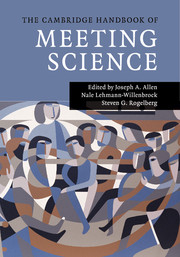Book contents
- The Cambridge Handbook of Meeting Science
- The Cambridge Handbook of Meeting Science
- Copyright page
- Dedication
- Contents
- Tables
- Figures
- Contributors
- Book part
- Part I Introduction
- Part II Premeeting Activities and Context
- Part III The Meeting Itself
- Capturing and Understanding Dynamics and Processes of the Meeting
- 12 Meetings as Interactional Achievements
- 13 Multimodal Perspectives on Meeting Interaction
- 14 Toward a Theory of Strategic Meeting Interaction
- 15 Social Dynamics at Work
- 16 Networks in Meetings
- 17 Effective Leader Behaviors in Regularly Held Staff Meetings
- 18 They Meet, They Talk…but Nothing Changes
- 19 Relative Status and Emotion Regulation in Workplace Meetings
- 20 Dynamic Affect in Team Meetings
- Tools and Models for Promoting Meeting Success
- Part IV Special Types of Meetings
- Part V Synthesis and Conclusion
- Book part
- Author Index
- Subject Index
- References
12 - Meetings as Interactional Achievements
A Conversation Analytic Perspective
from Capturing and Understanding Dynamics and Processes of the Meeting
Published online by Cambridge University Press: 05 August 2015
- The Cambridge Handbook of Meeting Science
- The Cambridge Handbook of Meeting Science
- Copyright page
- Dedication
- Contents
- Tables
- Figures
- Contributors
- Book part
- Part I Introduction
- Part II Premeeting Activities and Context
- Part III The Meeting Itself
- Capturing and Understanding Dynamics and Processes of the Meeting
- 12 Meetings as Interactional Achievements
- 13 Multimodal Perspectives on Meeting Interaction
- 14 Toward a Theory of Strategic Meeting Interaction
- 15 Social Dynamics at Work
- 16 Networks in Meetings
- 17 Effective Leader Behaviors in Regularly Held Staff Meetings
- 18 They Meet, They Talk…but Nothing Changes
- 19 Relative Status and Emotion Regulation in Workplace Meetings
- 20 Dynamic Affect in Team Meetings
- Tools and Models for Promoting Meeting Success
- Part IV Special Types of Meetings
- Part V Synthesis and Conclusion
- Book part
- Author Index
- Subject Index
- References
Summary
This chapter offers an overview of the unique contributions of conversation analysis (CA) to research on the science of meetings. We introduce CA as a sociological framework for studying the structures and processes of talk and interaction, showing how this approach enriches our understanding of human activity in meeting interaction. After a sketch of CA theory and method and the ways that basic interactional mechanisms are adapted to meetings, we review CA research on face-to-face meetings, including practices for distributing turns at talk, the interactional constitution of organizational identities, practices for displaying affect and building relationships with team members, and interactional resources for decision making in meetings. Moving into current developments in CA and meetings, we detail one interactional strategy used to manage disagreement during decision-making episodes in scientific peer review meetings. It involves the use of “formulations,” discourse practices in which interactants summarize and paraphrase the prior talk of other participants. We provide initial evidence of the use of formulations in peer review meetings to collaboratively navigate interactional troubles, allowing participants to work toward resolution of conflict, move ahead in the progression of meetings, and to possibly introduce individual biases into meeting deliberations and decision making.
- Type
- Chapter
- Information
- The Cambridge Handbook of Meeting Science , pp. 247 - 276Publisher: Cambridge University PressPrint publication year: 2015
References
- 6
- Cited by

